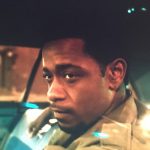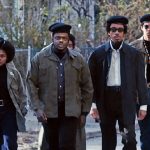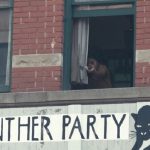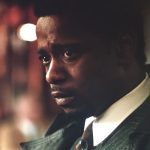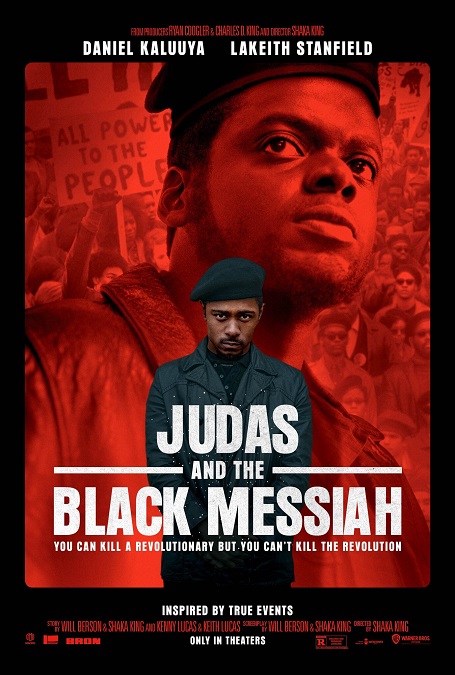



2020-21 – Judas and the Black Messiah
Racism has always been a difficult yet relevant issue in not only America, but all over the world. So it makes sense that a drama that focuses so intensely on the subject should get a lot of critical attention. This movie, directed by Shaka King, is about the true life events surrounding the shameful assassination of Fred Hampton, the Chairman of the Black Panther chapter in Chicago in 1969. Movies like this are necessary, because if not for them, I, and much of the rest of the world, would be completely ignorant of what actually happened. And I happen to believe the statement by George Santayana, saying that those who do not remember the past are condemned to repeat it.
My first concern needs to be about the historical accuracy of the movie. What did they get right, and what was altered to fit the medium? My research uncovered that the actual events were pretty accurate. Maybe some characters or events were combined or condensed, but they were all realistic. True, the headquarters of the Black Panthers were fire bombed, but in reality, it happened multiple times, and it wasn’t always the result of a shootout between the police and the Black Panthers. The movie made it seem like it was an isolated event. That kind of thing.
And some character motivations were altered or intensified to create a more dramatic narrative. For an example, I’ll return to that gunfight scene. The Black Panthers may have been militant and angry, but they weren’t stupid. In the film, the CPD gathered en-masse outside the Black Panther Headquarters, to verbally taunt the black people inside. The Party Members got their guns and were itching for a shoot-out. OK, let’s look at that for a moment. The Black Panthers knew that the police were looking for a reason to shoot them. So why would one of them stand visible in an open window, holding a shotgun? But for the most part, it was all pretty historically accurate.
And the performances were really good. Even though the film was the story of Fred Hampton, played by Daniel Kaluuya, the main character of the movie was the FBI informant, Bill O’Neal, played by Lakeith Stanfield. Most of the story was told from his point of view. I particularly liked the performance of Dominique Fishback, playing Deborah Johnson, Hampton’s girlfriend. She really stood out in the film’s climax. The camera focused on her face as we listen to the gunshot that kills Hampton off-screen, and she fights to hold back her tears.
Other members of the Black Panther Party included Ashton Sanders as Jimmy Palmer, whose death in the film sparked the series of events that eventually led to the assassination, Algee Smith as Jake Winters, Darrell Britt-Gibson as Bobby Rush, co-founder of the Black Panther Party chapter in Chicago, Dominique Thorne as Judy Harmon, and Amari Cheatom as Rod Collins, leader of the Crowns, a fictionalized version of a Chicago gang.
Another good performance was Jesse Plemons, playing Roy Mitchell, the FBI handler who eventually forced O’Neal to betray Hampton. At first they made it look like he was just doing his job, trying to gather information on the Black Panther party and its Chairman. But when O’Neal tried to get out of the operation, Mitchell pretty much blackmailed the informant into drawing a layout of Hampton’s apartment and drugging him on the night of the FBI raid. Plemons suddenly turned the character into a much more sinister bad guy.
But of course, the real stand out was Kaluuya. He had an energy and intensity about him that really commanded attention on the screen. He was awarded the Oscar for Best Supporting Actor for his performance. He needed to be large and charismatic in one scene, and then intimate and personal in the next. Kaluuya pulled it all off with sincerity and conviction, and I think he deserved his Oscar. He was especially dynamic in his fiery political speeches. The only problem was that the real Hampton was only 21 years old when he was killed. Kaluuya was 31, and it showed. But that’s a small thing. He still nailed the performance.
Now, I have to mention a slight misconception on my part when it comes to the title of the film, as it makes an interesting point. I assumed that the filmmakers were straight-up calling Fred Hampton the Black Messiah, but they weren’t. The title was a direct reference to a statement made by J. Edgar Hoover, played in the film by Martin Sheen. When the real Hoover said he wanted to, “Prevent the rise of a ‘messiah’ who could unify, and electrify, the militant black-nationalist movement,” he was talking in general terms, not about a specific person. It was just a huge convenience that it was a black informant who betrayed him, like Judas to Jesus.
That being said, I liked how they showed archival footage of the real Bill O’Neal confessing his role in the actual events, in a PBS interview in 1989. But like Judas, in a sad turn of events, racked by guilt, he ended up committing suicide on January 15th, 1990, the night that the interview was first aired on PBS. It had not been his first suicide attempt. The film was socially relevant, and it was well-made. If it had any flaws, it was that it felt a little too self-important, but that’s a minor issue.


